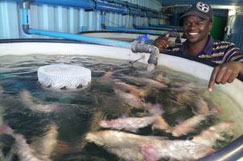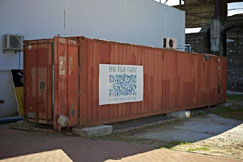Sustainable development
Fish farming in a shipping container
Local idea, global recognition
The Fish Farm is on a final shortlist of 23 "technical solutions for basic supply problems" that are in line to win the inaugural "empowering people Award", a competition launched by German-based organisation Siemens Stiftung at the UN Summit for Sustainable Development in Rio de Janeiro in 2012. Over 800 entries from around the world were submitted for the award, which aims to "connect innovations for basic supply problems in developing countries with potential partners, investors and other key players in development work". The winner will be announced in Nairobi, Kenya on 30 October.Feeding a family of four
Fleming recently outlined the Fish Farm's costs in an interview with Anton Crone on the blog Bright Continent, saying: "This prototype cost R150 000 (US$18 750). The next prototype should cost less, and produce four tons of fish per year, at a net profit ... of R36 000 ($4 500) per year. "I'm trying to reach a situation where it gives four people (or maybe one family) an income and/or high quality protein, right where they live. "I'm working with taking the operational expense of electricity out of the equation, and dumping into it a capital expenditure item of renewable energy (solar, wind, batteries). This adds R200 000 ($25 000) to the price ... if it gives four people a permanent livelihood, then that means about R80 000 per livelihood."'South African innovation in action'
The farm comprises six tanks of 1 500 litres each in a row, a 200-litre solids filter (to deal with solid waste), a 5 000-litre bio-filter (to deal with the chemical waste), a circulation pump and an aerator. It dumps 1% of its volume per day to maintain water quality. This nutrient-rich water can be supplied to vegetable farmers as an additional source of income. Fleming says the farm can be stocked with tilapia, a hardy fish that feeds on phytoplankton, microscopic plants. This is cost-effective for a cash-poor collective or family, as fish protein fish food, for carnivorous fish, is expensive. The Fish Farm is also designed to meet the livelihood and food needs of poorer urban families or farming collectives: the space required for the container is minimal, and it can operate on energy obtained from solar power. Additionally, at scale, it could help relieve pressure on marine ecosystems which are seeing fish stocks decline. "The Fish Farm is South African innovation in action," Fleming told News24 last month. "With urbanisation on the increase and unemployment a crisis, it demonstrates globally that amazing solutions to inner-city intensive protein production, new livelihoods which create new sources of wealth, and less reliance on a depleting marine environment are completely possible." SAinfo reporter
Gardener-turned-aquaculturist Lungile Mafilika, who has worked with Alan Fleming on the Fish Farm project from the outsest (Photo: empowering people. Award)

Bringing aquaculture to the poor: the Fish Farm in Philippi, Cape Town (Photo: Anton Crone, Bright Continent)




